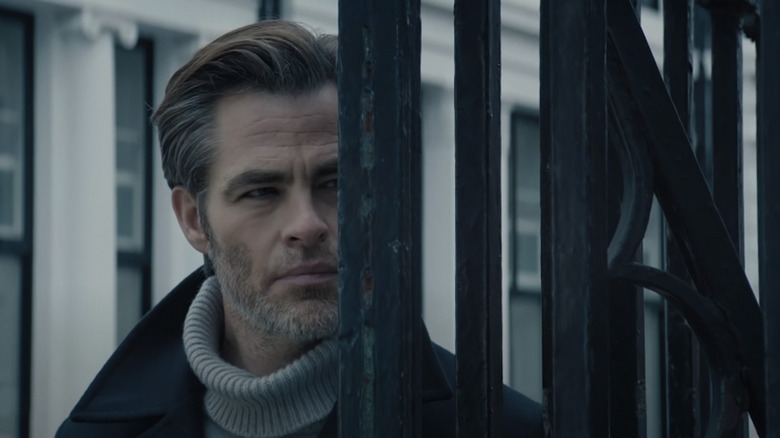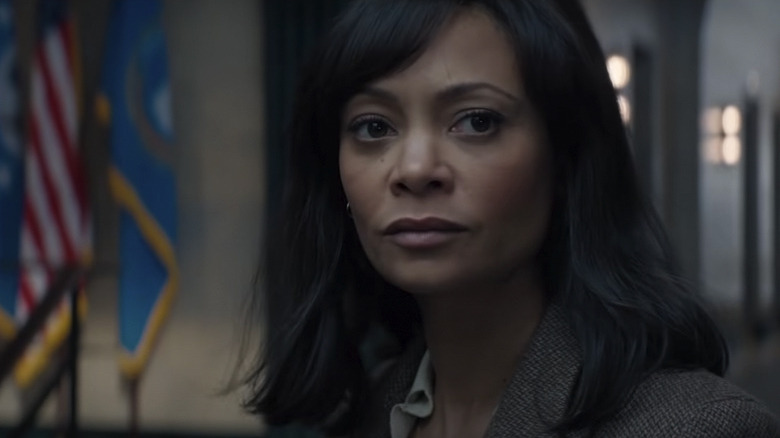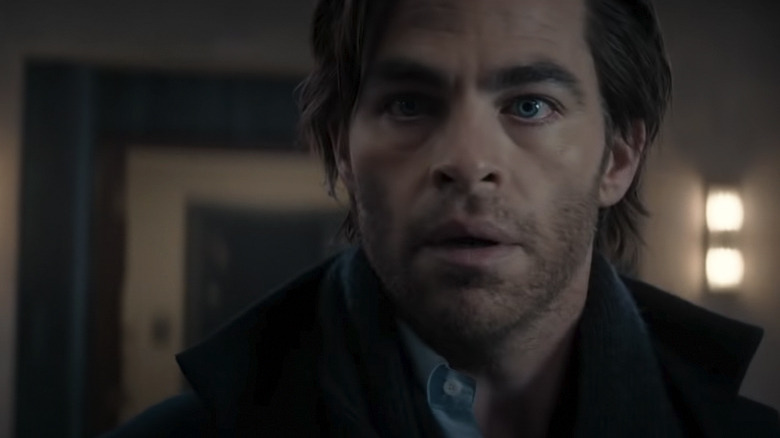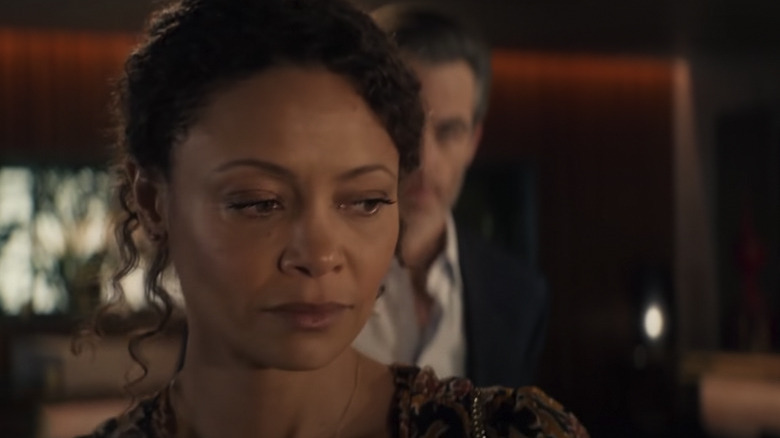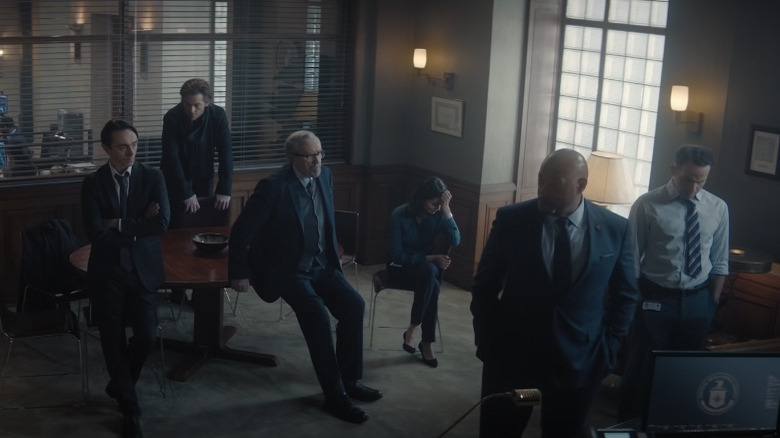All The Old Knives Director Janus Metz On His 'Intense Mind Game' Of A Movie [Interview]
"All the Old Knives" is the type of movie we often decry as not getting made anymore in the era of mega-budget blockbusters and micro-budget indies. But Janus Metz, the Danish filmmaker whose credits include "Borg vs. McEnroe" and episodes of hard-nosed shows like "True Detective" and "ZeroZeroZero," did the thing we always say we want: He grabbed a group of big names (in this case, Chris Pine, Thandiwe Newton, Laurence Fishburne, and Jonathan Pryce) and made a mid-budget thriller aimed directly at adults.
This is a spy movie based on Olen Steinhauer's 2015 novel (Steinhauer also wrote the screenplay), and it's much more indebted to the cerebral works of John le Carré than, say, the action-centric thrillers by Robert Ludlum. If you're looking for explosions galore and fist-pumping car chases, you won't find them here. Instead, "All the Old Knives" is a quietly intense puzzle of a movie, featuring layers of story being doled out across multiple time periods. Years after a botched CIA mission leads to a botched romance, two former operatives (Pine and Newton) reunite with questions lingering in the air about exactly what went wrong and who knew what when. I recently spoke with Metz about the film's intimate scale, its non-linear structure, that erotic food sharing sequence, and more.
'How do I understand these characters?'
One of the things I often hear from filmmakers is that they "found the movie in post-production." What did you learn about your film during the editing process that you didn't know about it before?
Well, I think you always do, but it's a little hard for me to say there was a before and after. Every step of filmmaking, I think, is a process of exploration and discovery. There's a popular saying that you make a film three times: You write it, you shoot it, you cut it. And I would say on top of that, you create a sound design and you color grade it, and all of those things add a layer of storytelling and exploration. However, I would say, even back — this is a story that derives its backbone all the way back from Olen's novel and then into the screenplay. We are always trying to refine that and dive deeper into, in a way, Henry and Celia as two characters that have an existential journey through the film. As a filmmaker, that's the most important thing for me, is always the characters and how do I understand these characters? What is it exactly that's driving them and they're hoping for and they're longing for? It's more like a process of diving and excavating throughout.
Structurally, the movie can get fairly complex at times, diving into flashbacks of flashbacks and jumping back to present day. Did you and your editors, Mark Eckersley and Per Sandholt, play around with different ideas about how to reveal the pieces of this story?
We worked as a very tight team. I mean, the challenge of making a film like this is you don't want to reveal things too early, but you also want to reveal enough to keep audiences hooked in. This is a very complicated story because you have three time periods that have to collide and you have two main characters and you have quite an important, supportive cast around that, so there's a lot of ground to cover. And when to put out the next piece of the puzzle and in which order, I think is something that you play around with until the very end, where you feel like, "Okay, now I've explored different ways through this story and this feels to me like the most satisfying way of telling the story."
'I've never been much of a sound stage guy'
How did the limitations of filming during a pandemic inform how you approached the visuals of the movie?
It's funny, because sometimes as a filmmaker when you're at the end of that process, it all feels like that was the obvious way of doing it. Hopefully you feel good about your choices, because they came out of the process of excluding other kinds of choices. We were probably more studio-driven with this film because of the pandemic than we would otherwise have been, but then looking back at it and seeing all the great things we managed to achieve in that studio environment, I would say, if I had to shoot the film again, I'd probably do it in the exact same way.
But I've never shot, percentage-wise, so much on a sound stage as we did with this film. I like shooting, I like to be location-driven. I like to take all the juice and the energy and the realism that you get from real locations and how they feed into your filmmaking, so I've never been much of a sound stage guy. But with this film, and with the production designer, Marcus Rowland, being obviously very critical to that, we just managed to build such beautiful stages that I think, if I had to do it all over again, that would make a lot of sense to me.
There's something about the intimacy of this film and the relationship between those central characters, where it feels right, being on stages a lot and enclosed a little bit, that almost claustrophobic feel the characters have.
Yeah. Well, essentially, there's two main locations, right? There's the CIA office in Vienna, and there's the restaurant in present day. So I mean, you are in closed off rooms and every now and again, you go out into the street, which we obviously had to do, and you feel like you let it go and you have the richness, the splendor of the California coastline juxtaposed with the office spaces and bleak, wintry Vienna, sunny California. So I think there's a beautiful interplay between those things. But you're right, the core of the film takes place in closed off rooms.
'It's almost like a poker game'
So you mentioned that restaurant, and there are actually a couple different moments during that dinner sequence where the main characters are eating together and they share food with each other in this subtly erotic way, where words are not spoken but a lot is being said in the way that they share their food. So can you talk about shooting that scene and whether or not that required a lot of finesse to achieve the tone that you were looking for there?
Well, we spent two weeks shooting that restaurant and building every step and every little move, because it's almost like a poker game, right? One puts in, and the other one raises and calls the bluff — there's that constant back and forth. It's an interrogation, and we move closer and closer to them as it becomes more and more intense. Every little gesture, every little flicker of the eye means something. The way they taste each other's food, obviously, means something, and without revealing too much, it's going to be one of the most important things in the film toward the end.
So there was a great play of positioning Easter eggs. If you go back and watch the movie a second time, I think audience would go, "Oh f***! I never saw that the first time. It's so great how she fed him that little piece of food." At the same time, yes, it's erotic, because there's a great love story between these two characters. In some ways, I guess, you'd hope that they could get back together again. We have to feel that these two people were meant for each other, and that that's very much alive.
'It wasn't driven by big action sequences'
This is not the type of spy film where there are huge explosions or big chase scenes. I'm curious if you ever felt any pressure along the way from anyone to juice it up a little bit.
No, I think everyone that came together around this movie really understood what the film was: An intense mind game happening over the course of a dinner then with flashbacks to the past. And it wasn't driven by big action sequences, but it's driven by this cat and mouse game and a permeating, dense atmospheric sense of paranoia, mistrust. That was the excitement of the movie, so there was never any pressure for anyone to make another kind of film than the one that we had at hand.
"All the Old Knives" arrives on Prime Video on April 8, 2022.
